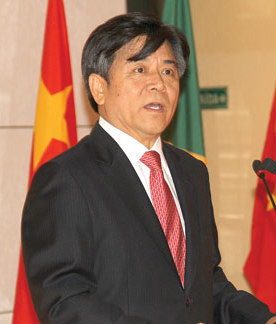China and Brazil forge closer economic ties
Updated: 2015-02-23 17:07
By Yang Yao in Beijing(China Daily Latin America)
|
||||||||
Cooperation between China and Brazil has deepened since last July when President Xi Jiping visited Brazil.
There has been much progress in cross-border cooperation in just a few months, Li Jinzhang, the Chinese ambassador to Brazil, pointed out in a recent interview in O Estado de Sao Paulo, a daily newspaper published in the Metropolitan region of Sao Paulo, Brazil.
President Xi visited Brazil in July 2014 and forged a strategic partnership with Brazilian President Dilma Rousseff. In all, the two leaders signed 56 cooperation documents worth a total of $35 billion, deals that include trade, investment, finance, infrastructure, technology, and culture.
|
|
|
Li Jinzhang, the Chinese ambassador to Brazil |
"Industrial and Commercial Bank of China is expected to get 20 E-190 planes it purchased from E
Besides the plane purchase agreement, China reached a deal to import Brazilian beef and genetically modified corn, the ambassador said.
China, Brazil and Peru in addition have signed a memorandum of understanding regarding cooperation on a proposed transcontinental railway that will link the Pacific and Atlantic oceans from the Peruvian to the Brazilian coasts. A feasibility study on the viability of the project has been launched. Further, Chinese smartphone manufacturer Huawei has completed a cloud data center in Manaus, Brazil.
The ambassador also discussed China's plan to invest in pre-salt oil in a time of plummeting international oil prices.
Li said that in the short-term, the investment on such energy exploitation would be reduced; but in the long run, exploitation of unconventional oil and gas is definitely in the cards.
At present, falling oil prices influences the exploiting of unconventional oil and gas, such as shale gas, pre-salt oil and oil sand. Pre-salt layer is a geological formation on the continental shelves.
The major reason for falling oil prices is the change in supply and demand dynamics in the international oil market, Li said.
He said that on one hand, the demand for energy like oil is declining, as the global economy recovery is weak; on the other, the oil supply is growing as United States and Canada develop shale oil rapidly, and OPEC countries have not taken measures to reduce oil production.
However, the ambassador maintains a positive attitude about oil prices. He said the price of oil has historically experienced ups and downs, and is expected to rebound. For unconventional oil like pre-salt oil, he believes that technology will reduce the cost.
"Take an example of shale gas exploitation in America; the advancement of technology has reduced the cost down to $60 per barrel. I believe that the exploitation of pre-salt oil will cost less and become more competitive," he said.
Brazil has rich resources of pre-salt oil, and has cutting-edge technology in deepwater oil exploration. In 2013, Brazil for the first time opened bidding for deepwater oil exploration and two Chinese companies - China National Petroleum Corporation and China National Offshore Oil Corporation - won the oil concessions in a joint bid.
"China has built a strategic partnership with Brazil and encouraged competitive Chinese enterprises to participate in the area," Li said.
yangyao@chinadaily.com.cn

 Texas Lunar Festival fun
Texas Lunar Festival fun
 Stars arrive at 87th Academy Awards
Stars arrive at 87th Academy Awards
 'God of Wealth' promotes US pears
'God of Wealth' promotes US pears
 Man's best friend: border soldiers and a military dog
Man's best friend: border soldiers and a military dog
 Couple sentries guard China's northern border during traditional holiday
Couple sentries guard China's northern border during traditional holiday
 Another winter storm to pummel eastern United States
Another winter storm to pummel eastern United States
 2015 Film Independent Spirit Awards
2015 Film Independent Spirit Awards
 Beautiful sceneries of early spring flowers around China
Beautiful sceneries of early spring flowers around China
Most Viewed
Editor's Picks

|

|

|

|

|

|
Today's Top News
Savoring benefits of medicinal foods
Alejandro G. Inarritu wins Best Director for 'Birdman'
Chinese enjoy shopping, massages and travel to ring in New Year
Foreign minister to preside at UN
Innovation bright spot as economy slows down
Ballet appreciated as form of valuable cultural exchange
Climate pact offers improved relations
Four Chinese among top 100 for Mars One project
US Weekly

|

|








